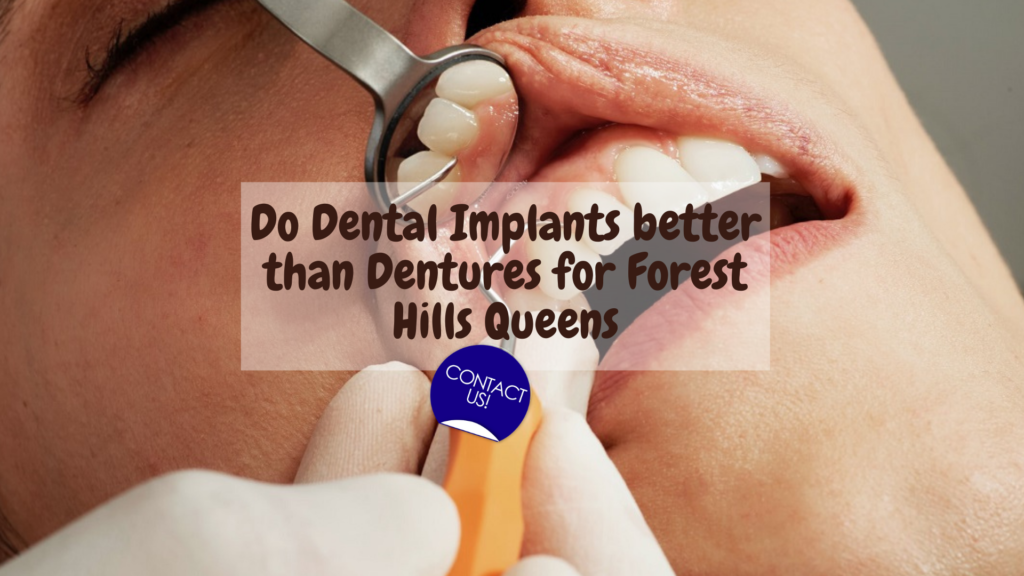Do Dental Implants better than dentures for Forest Hills Queens, NY?
Dentures and implants are both alternatives for replacing lost teeth. Dentures are a less expensive choice, but they do not last as long and can cause more discomfort, looseness, and eating and speech problems. Although implants are a viable alternative for replacing naturally occurring teeth, the high cost may not be accessible for everyone.
If you are missing teeth, the most important thing to remember is that you must get them replaced using a method approved by your dentists, such as dentures or dental implants. Teeth loss can have a detrimental impact on your overall health and oral hygiene.
Dentures and implants are both feasible options because they allow patients to chew while eating a variety of foods. Both methods are capable of replicating genuine teeth. However, not everyone has the opportunity to choose. Implants are not an option for some patients due to untreated jawbone or gum disease. Dentures are, but they are not suitable for everyone. If the dentures do not rest on a bone ridge within the jaw or on existing teeth, it may be difficult to create an appropriate seal to keep them in place. Find the Best Forest Hills Dentist.
Because of technological improvements, the majority of people can now utilise dental implants or dentures, so it’s just a matter of weighing the benefits and drawbacks and determining which one is ideal for you.
Dental implants are more expensive than dentures. They do not, however, address the issue of jawbone loss. When your body detects missing teeth, it begins to absorb mineral compounds from the jaw and channel them to other regions of your body. The jaw region where the tooth’s root is located weakens, deteriorates, and becomes weak as a result of this process. Teeth begin to migrate toward the open area on one side or the other of the space. The patient’s face may gradually sag, changing the form of the face and making dentures uncomfortable to wear.
Contacting our dentists to find out if you’re a candidate for dental implant surgery is the best approach to avoid further tooth loss and jawbone damage. Dental implants are recommended wherever possible to help patients avoid the long-term health hazards of tooth loss.
1. The advantages and disadvantages of implants versus dentures
Dental implants provide numerous advantages.
Affordability: Once your dental implants are in place, you can treat them just like your natural teeth. Implants, unlike dentures, do not need to be removed and soaked overnight; instead, they can be cleaned. Dental implants ensure that someone who is self-conscious about their look due to one or more lost teeth is not caught off guard.
The Jawbone has been awoken. A titanium screw is inserted into the jawbone to secure dental implants. The screw is the real tooth’s root, serving a purpose for the jawbone and preventing bone loss. A strong and healthy jawbone is required to maintain facial structure.
Cosmetic dental implants are among the most natural-looking and feeling of all artificial options.
Dental Implants Have Downsides Implants have drawbacks.
Budget and Time: Dentures are typically more labour-intensive to make than dental implants. However, both are made to order. Dental implants necessitate additional preparation time. Although a dental implant can be placed in one day, the jawbone and implant post must fuse over 3 to 6 months. As a result, implants may necessitate more appointments and orthodontia. As the jaw recovers during the osseointegration process, a temporary replacement might be employed.
Some people require sinus augmentation or bone grafting to support an implant, which can add time and cost.
Advantages of dentures in terms of cost: Dentures are less expensive than implants, especially when multiple teeth or a whole arch are required. Dentures may be an excellent option for those on a low budget.
When it comes to surgical operations, it is ideal to perform less (or none at all). Dentures do not require as much dental surgery as implants do, so they may be made and installed more quickly.
Dentures have a few disadvantages.
Levels of comfort: Even while dentures have improved over time, they can still cause sores. Dentures that are not properly fitted might cause painful sores. Patients should see their prosthodontist or dentist for an assessment and maybe have their dentures fixed or modified so that they do not hurt their gums in the event of. Whatever the size of the denture’s fracture, it must be addressed, and the dentures must be relined as soon as possible to avoid gum irritation.
Dietary changes: When adjusting to dentures, the majority of individuals keep to a diet centred on soft foods; nevertheless, some people continue to do so for a long time because biting and chewing complicated food items can create sores to the gums on which dentures rest. Saliva is required to keep the dentures and gums from coming into touch. Certain meals can impair saliva flow. One of the primary causes is the consumption of salty foods. However, drinking more water may assist to offset the salty meal effect.
Degeneration of the Bone Dentures, unlike dental implants, do not help to protect the jawbone. Our natural teeth are held in place by the jawbone. When teeth fall out, our bodies deem the jawbone to have served its role, and bone resorption may occur as a result. As much as 25% of the jawbone may break down within the first 12 months after many teeth are lost. The look of the face may change as a result of bone resorption.
2. Implants vs. anchored dentures
Implant-anchored dentures are those that are held in place by a variety of implant-supported dental devices (usually 4). Implant-anchored dentures are held in place by dental implants, which can be either removable or permanently implanted inside the mouth. Dental implants must first be surgically implanted into the patient’s jawbone and then allowed to heal before dentures can be attached to them.
The following are some of the benefits of implant-supported dentures:
Because implant-anchored dentures rely on dental implants surgically put into the patient’s jawbone, it is stimulated, which is important for a person’s oral health. As a result, persons who wear this type of denture can eat anything they want, drink whatever they want, laugh loudly, and converse freely without worrying about the dentures falling out.
3. Are there any other options for dentures?
If you don’t need dentures, your dentist may recommend dental implants, overdentures, or dental bridges to replace them. They will guide you through your dental replacement alternatives based on your dental condition, the density of your jawbone, and the number of missing teeth.
Dental implants are a type of dental implant that is used to replace lost dental implants.
Dental implants, the most well-known and efficient approach, can be used to replace dentures. Implants are titanium anchors that are surgically implanted in the jawbone to secure the new teeth. This surgery can be carried out by a top Dentist in Queens.
Bridges for teeth Unlike dental implants, you won’t have to worry about your tooth bridge falling out while you chew, speak, or smile. It is a prosthetic tooth that is securely attached in the precise location between the two crowns or dental implants. The only disadvantage of dental bridges is that they are installed in place of dental crowns. The neighbouring teeth’s healthy tooth material must be removed.
Dentures can be changed with a variety of methods, including dental implants or even overdentures, to ensure that you are at peace and pleased with the new appearance of your smile. When you do not want dentures to replace your missing teeth, you have other options for regaining your beautiful smile. If you have many rows of teeth and don’t want to deal with the disadvantages of dentures, consult with our dentist to evaluate the best solution for your teeth and you.
4. What are the advantages and disadvantages of dentures that snap on?
Aids in the re-establishment of excellent eating and speaking habits.
Dentures that are more durable than regular dentures
Aesthetics exceed traditional dentures.
Dental implants minimise bone loss and require fewer implants than fixed implant-supported full dentures.
Surgery is one of the more expensive options for tooth replacement. is required.
When compared to normal dentures, the recuperation time is longer.
This method is not as effective as All-on-4 or traditional dental implants.
5. Is a dental extraction better than an implant for a tooth worse?
The most often requested question from those considering installing dental implants for the first time is how much pain they will experience throughout the process. Patients frequently inquire whether implant placement is less or more painful than a tooth extraction, which they have most certainly experienced. Because everyone experiences pain differently and treatment options are very specific, there is no universal cure. However, most patients have less discomfort following the surgery than after tooth extraction.
Dental implants are, at their core, surgical operations, and every surgical process is unpleasant. The majority of patients experience no discomfort as a result of the use of anaesthetic during implant surgery. Patients who require bone implants or additional therapies may find the operation more challenging than those who only need the main implant. In some circumstances, surgery can be more painful than in others. Dr. Michael Tyner is an Emergency Dentist in Queens.
Oral surgeons, on the other hand, consider these factors while planning anaesthesia to ensure that their patients are as comfortable as possible. General or local anaesthetics can be used according to the patient’s needs, and sedation therapies ranging from oral sedatives to IV sedation are frequently used for patients who are extremely sensitive to pain or are scared or worried about dental procedures.
6. Do you require a bridge or an implant?
These are the benefits of dental bridges.
the possibility of becoming covered
It does not necessitate any invasive surgery or bone grafts.
It is less expensive in the beginning than dental implants.
A dentist usually only requires two appointments spread out over a few weeks.
Dental bridges have the following disadvantages:
They should be examined at least 5 to 7 times a year (although they can last as long as 10 years)
With time, implants lose their original appearance. Implants are more likely to induce dental decay and cavities in neighbouring teeth than natural teeth.
It has the potential to affect healthy teeth near the lost tooth’s location.
A dentist can assist you in selecting the best replacement tooth for your needs. Your budget, as well as the number of lost teeth and your overall health, will determine the best option for you.
Time
A dental bridge can be fitted in just two visits to the dentist over a few weeks, but an implant for your dental needs can take months to complete. In contrast to oral healing, the surgeon can drill into your patient’s jawbone and then secure the implant’s root into the bone.
Michael A Tyner DDS Pc Covers the Following Towns nearby Forest Hills, New York
Rego Park, Ozone Park, Fresh Meadows, Jackson Heights, Ridgewood, Flushing, East Elmhurst, South Ozone Park, Maspeth, Woodside, Hollis
Brought to you by Best Dentist in Forest Hills
The post Do Dental Implants better than Dentures for Forest Hills Queens, NY ? appeared first on https://wookicentral.com
The post Do Dental Implants better than Dentures for Forest Hills Queens, NY ? appeared first on https://gqcentral.co.uk
The post Do Dental Implants better than Dentures for Forest Hills Queens, NY ? appeared first on https://alef3.com






Comments are closed